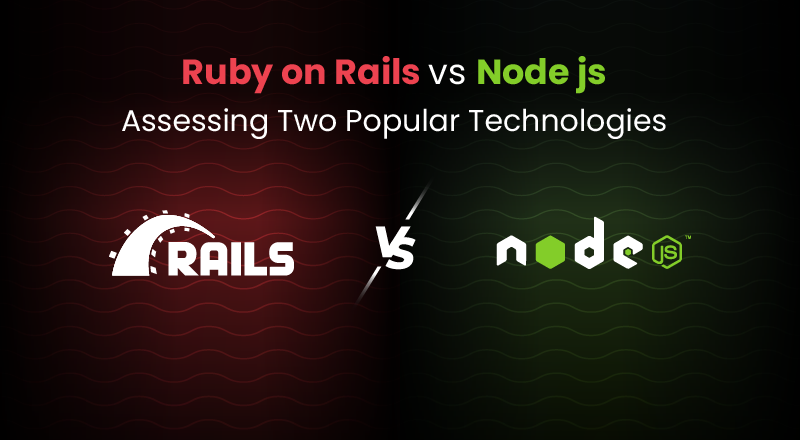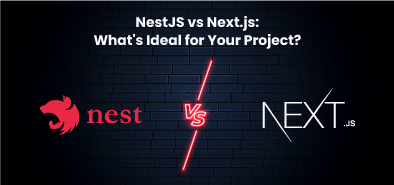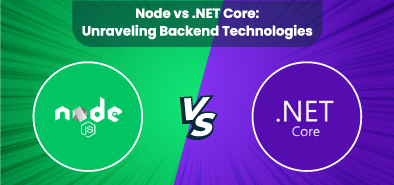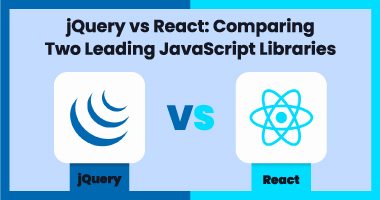Ruby on Rails vs Node js: Assessing Two Popular Technologies

As technology advances, selecting the proper frontend and backend tools becomes more critical and confusing. Especially when it comes to backend technologies, multiple choices are available, of which two names are quite famous and in constant comparison – Ruby on Rails vs. Node js.
Both technologies have garnered reviews from the IT fraternity and are well-accepted worldwide. Node.js is more of a runtime environment that helps users convert client-side code to server-side.
This article discusses the pros and cons, the alternatives, and the differences between them to assist in taking the final call. Before we investigate further details, let us glance at their overall characteristics.
What is Ruby on Rails?
Rails is a full-stack framework. It ships with all the tools needed to build amazing web apps on both the front and back end. It compresses the complexity of modern web apps.
Ruby on Rails is often referred to as Rails. It is an MVC and web application framework written in Ruby. It offers default structures for web applications, web servers, and databases. It best uses web standards like XML or JSON for transferring data and HTML and CSS for UI and styling. It has a short, clear, and flexible syntax.
It leverages software engineering patterns, including Don’t Repeat Yourself (DRY), Convention over Configuration (COC), etc. It showcases code efficacy and high speed with features such as database table creation and migration, scaffolding of views, etc. Rails is known for database-related MVC web applications, data computing, routine management, etc.
What is Node js?
Node.js is an open-source, cross-platform JavaScript runtime environment built on Chrome’s V8 JavaScript engine.
It is a popular JavaScript framework that writes JS on the client and server sides and greatly helps create scalable network apps. It is event-driven, asynchronous, lightweight, effective, and follows a non-blocking process. The server-side runtime is a real-time JavaScript application that works across operating systems.
Hence, Node.js application development is ideal for applications that require data intensification across different devices. It is single-threaded and can be installed on various platforms like Windows, macOS, and Linux. It uses an event-driven, non-blocking I/O model. It is lightweight and ideal for data-intensive, real-time apps that execute through different devices.
Ruby on Rails vs Node.js: The Pros and Cons
Pros of Ruby on Rails:
- Reduced development time
- Cost-effective and saves on licensing fees
- Extensive community support
- Fewer errors with smooth production
- Easy to learn for novices
- Highly secure, with Rapid Application Development
- Abides by standards and regulations
- Follows MVC architecture
- Active Record pattern
- Convention over configuration
- Automated deployment to the server
- Enriched libraries and gems
- Massive infrastructure with inbuilt web server
- High-end code quality
Cons of Ruby on Rails:
- Not fit for complicated applications
- Less flexible and scalable
- Slower as compared to others
- Lack of a static typing system
Pros of Node.js:
- Freedom to code your way
- Non-blocking I/O system
- Easy to learn for novices
- Faster response time with no code re-execution
- Writes frontend and backend in JavaScript
- Fast engine support with high-speed code
- More scalable, easier, and faster development
- Knowledge of JavaScript sufficient for the creation of effective apps
- Cross-platform compatibility
- Connected community support
- Smooth JSON support
- Extendable to suit project needs
- Faster Microservices development
- Modular and reusable code
Cons of Node.js:
- The constant change in API
- Not fit for CPU-intensive tasks
- Difficult security issues
- There are a few poor-quality packages in the npm repository
Node.js vs Ruby on Rails: Key Alternatives
Ruby on Rails Alternatives:
Django, Laravel, Sinatra, Express.js, Hanami, Yii, Laravel, Symfony, ASP.Net, Restify, Flask, Koa, Phoenix, AdonisJs, etc.
Node js Alternatives:
Some Node JS alternatives are Python, Deno, Java, ASP .NET Core, Ruby on Rails, Ext JS, AngularJS, Elixir, Perl, Go, Ruby, Rebol, Ceylon, etc.
Organizations Using Ruby on Rails and Node.js
Companies That Use Node.js:
NASA, Twitter, Netflix, eBay, Trello, PayPal, Microsoft, LinkedIn, Walmart, Uber, New York Times, Medium, Hapi, Yahoo!, GoDaddy, Twitter, Citibank, Capital One, etc.
Companies That Use Ruby on Rails:
GitHub, Hulu, Dribble, Basecamp, Airbnb, SlideShare, Couchsurfing, Bloomberg, Fiverr, Shopify, Kickstarter, Zendesk, Groupon, Coinbase, Square, Netguru, Heroku, etc.
Ruby on Rails vs Node js: The Clash of the Backend Tools
| Parameters |
Ruby on Rails |
Node.js |
| Overview |
A Ruby-based development framework is the best fit for developing a complex and extensive application. Offers quick development of web apps and websites with Ruby. |
A JavaScript runtime framework best suited for developing fast applications. It offers fast and scalable network applications with Chrome’s JavaScript runtime engine. |
| Programming Language |
Ruby |
JavaScript |
| Use Cases |
eCommerce and social networking apps, content management systems, SaaS-based projects, database-driven projects, MVPs, cloud apps with complicated databases, web apps, prototypes |
Collaborative tools, data streaming web apps, real-time chat apps, social media apps, single page apps, publishing apps, eLearning platforms, Microservices, IoT-based apps, API development, games |
| Application Development |
Backend application development |
Frontend and backend application development |
| Number of Threads |
Multi-threaded, hence more responsive and user-friendly |
Single-threaded, hence faster in execution |
| Type of Framework |
Opinionated with less control |
Non-opinionated with more control |
| Development Time |
Faster with fewer commands |
Slower with more lines of code |
| Performance |
It is slower than Node.js because of the time-consuming garbage collection process. |
Faster than Rails because of a conducive environment for smaller tasks |
| Scalability |
It is not as scalable as Nodejs because it requires a lot of resources and cannot easily scale them as needed. |
It is more scalable than Rails because of the non-blocking I/O model and clusters with abstractions that can spawn processes with minimal CPUs. |
| Installation |
It needs a lot of generators for installation |
Easy to install with some archive files |
| Learning Curve |
Easy to learn but needs knowledge of objects, classes, etc. |
It is more accessible to learn, flexible, and understandable |
| Application Architecture |
Developers can use MVC architecture |
Developers can use MVC/MVP architecture |
| Testing Capabilities |
Inbuilt testing system and hence simple and effective testing |
A lot of third-party libraries and hence help in effective testing |
| Deployment |
Rails are speedy and light, and hence, tasks can be performed in no time |
Node.js may take little time for integration and searching modules |
| CPU Intensive Tasks |
It fits CPU-intensive tasks such as data processing, image processing, and RAD – Rapid Application Development. |
It will cause a hung of web applications when handling CPU-intensive tasks as it uses a single thread. It will take a long time. |
| Resource Availability |
It is difficult to access good Rails resources as very few have detailed knowledge about RoR. |
It is easy to get access to good Node resources as there are many with experience in Node.js. |
Ruby on Rails vs Node JS – When to Use What?
You can select RoR when:
- There is a need to create full-stack applications, eCommerce/social media platforms with more traffic, content management systems, informational apps
- Do you want to implement MVP
- You want to create a SaaS platform with multiple APIs
- Rapid Application Development is significant
- CPU-intensive tasks are a priority
- You wish to create a stock exchange platform
You can select Node js when:
- There is a need to create web applications for streaming content, single page applications, web apps with data processing competencies
- You want to build a real-time multiuser web application, browser-based game apps
- There is a need for real-time apps like messengers, online games, collaborative apps
- Performance and scalability are important
- There is a need for REST API development
- There is the management of hundreds of concurrent requests
Which one is Better? Ruby on Rails or Node js
When you compare Ruby on Rails vs. Node.js, both Node.js and Ruby on Rails are potent frameworks for applications and websites. However, it is a tough call when one must be finalized. Before making the final decision, organizations must consider their project scenario, business models, resource availability, costs, and project deadlines.
The above criteria could be very helpful in deciding on a choice based on the available situations. The choice also depends upon your organization’s strength in terms of years of experience and resources.
Both these technologies – Ruby on Rails and Node.js- have pros and cons to showcase. What matters is the support and proficiency you get from experienced IT partners to carry on your assigned software development tasks.
As a leading Node JS development company, SPEC INDIA makes skilled talents easily accessible to global businesses that want to enhance their marketability and accomplish their objective. We are your one-stop shop for providing enterprise-grade, performant web and mobile solutions.
Our NodeJS developers are apt at exhibiting the best industry and technology standards, offering the finest Node JS application development, be it any project execution methodology. Hire a Node JS developer from SPEC INDIA to acquire maximum potential from the Node.js framework with expertise from years of experience.
SPEC INDIA is your trusted partner for AI-driven software solutions, with proven expertise in digital transformation and innovative technology services. We deliver secure, reliable, and high-quality IT solutions to clients worldwide. As an ISO/IEC 27001:2022 certified company, we follow the highest standards for data security and quality. Our team applies proven project management methods, flexible engagement models, and modern infrastructure to deliver outstanding results. With skilled professionals and years of experience, we turn ideas into impactful solutions that drive business growth.







